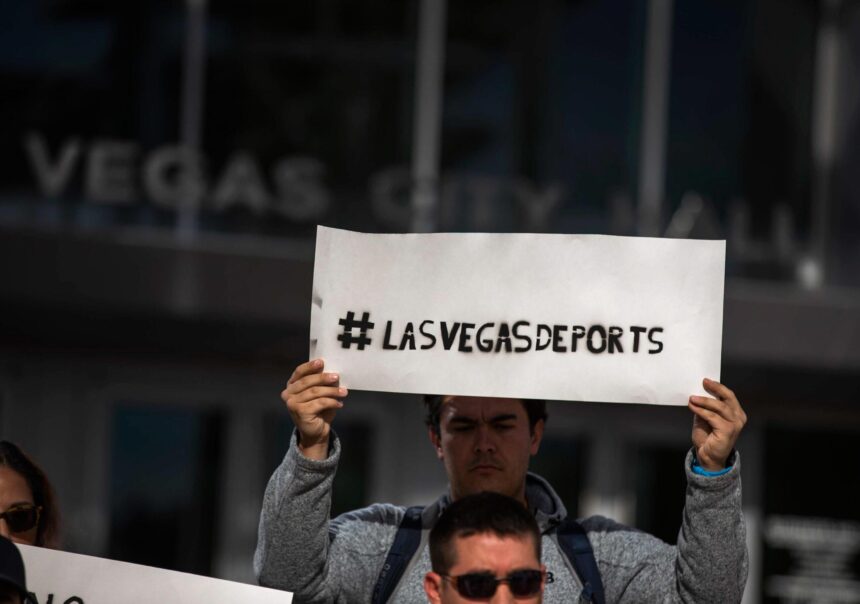Nevada Intensifies Actions Against Repeat Illegal Reentries
In recent weeks, Nevada law enforcement has detained multiple individuals who had been previously deported and are now charged with illegal reentry into the United States. These arrests were executed as part of a targeted operation aimed at reinforcing border security and ensuring compliance with immigration laws.Officials confirmed that the suspects deliberately violated immigration statutes, resulting in their swift apprehension and transfer to federal custody.
Analysis of these cases reveals a recurring trend of unauthorized attempts to reenter the country.Below is a summary of the latest detainees and pertinent details:
| Name | Age | Date of Last Deportation | Arrest Location | Charge |
|---|---|---|---|---|
| Michael S. | 36 | April 2023 | Las Vegas | Illegal Reentry |
| Javier L. | 31 | August 2022 | Reno | Illegal Reentry |
| Ricardo V. | 43 | January 2022 | Carson City | Illegal Reentry |
Law enforcement agencies stress their dedication to enforcing immigration regulations, underscoring that these arrests serve as a deterrent against unauthorized border crossings. Community members are urged to remain vigilant and report any suspicious behavior as authorities continue their mission to uphold legal order and public safety throughout Nevada.
- Increased surveillance along border regions.
- Enhanced cooperation among local, state, and federal enforcement bodies.
- Public education initiatives promoting lawful immigration channels.
Judicial Procedures and Penalties for Illegal Reentry Offenses
Those caught reentering the U.S. unlawfully after deportation face meaningful legal repercussions. Federal statutes, particularly 8 U.S.C. § 1326,govern these offenses,prescribing penalties that may include imprisonment,monetary fines,and supervised release. Nevada courts have reported a rise in such cases, with defendants undergoing a structured legal process that includes detention, arraignment, and subsequent hearings to establish culpability and determine sentencing.
The judicial timeline is often expedited due to the high volume of cases and federal guidelines. Defendants are entitled to legal representation and may negotiate plea deals to lessen potential sentences. The typical stages in these proceedings are:
- Indictment: Formal charges presented by prosecutors or grand juries.
- Arraignment: Initial court appearance where pleas are entered.
- Pre-trial motions: Legal debates over evidence and procedural matters.
- Trial or plea hearing: Case resolution through verdict or agreement.
- Sentencing: Penalty imposition following conviction or plea.
| Stage | Approximate Duration | Possible Outcome |
|---|---|---|
| Arraignment | 1 day | Plea entered |
| Pre-trial Motions | 2-4 weeks | Decisions on evidence admissibility |
| Trial / Plea Hearing | 1-3 days | Guilty verdict or plea agreement |
| Sentencing | Within 30 days after verdict | Imprisonment, fines, or probation |
Effects on Communities and Law Enforcement Strategies
The apprehension of previously deported individuals attempting illegal reentry has stirred concerns among Nevada’s local populations. Residents voice apprehensions regarding public safety and community stability, emphasizing the necessity for robust border control measures. Economic repercussions have also been noted, with some businesses experiencing workforce fluctuations. Community leaders advocate for increased funding to bolster social support systems and promote neighborhood vigilance, while avoiding fear-mongering or social division.
Law enforcement faces the complex task of enforcing immigration laws while maintaining public trust and cooperation.Authorities are adopting a multifaceted approach that includes:
- Strengthened collaboration between federal immigration authorities and local police departments.
- Community engagement programs designed to foster mutual understanding and partnerships.
- Specialized training for officers on managing reentry cases with cultural sensitivity.
| Focus Area | Objective | Expected Result |
|---|---|---|
| Border Enforcement | Prevent unauthorized entries | Decrease in repeat illegal crossings |
| Local Policing | Community-oriented policing | Enhanced public confidence |
| Judicial Handling | Efficient case processing | Stronger deterrence |
These initiatives are vital as Nevada navigates the complexities of immigration enforcement while striving to maintain safe, inclusive communities. Balancing security with social cohesion remains a critical challenge for policymakers and law enforcement alike.
Policy Recommendations and Advanced Border Security Solutions
To effectively combat the surge in illegal reentry incidents, Nevada must invest in both technological advancements and thorough policy reforms. Cutting-edge surveillance tools—such as AI-driven drones, infrared sensors, and real-time data analytics—can significantly enhance border monitoring capabilities, enabling quicker interdiction of unauthorized crossings. Moreover, fostering stronger partnerships among federal, state, and local agencies will streamline enforcement efforts and accelerate apprehensions, thereby discouraging repeat violations.
On the legislative front, reforms should aim to expedite judicial proceedings related to reentry offenses, alleviating court backlogs and ensuring prompt resolutions. Additionally, implementing targeted rehabilitation and education programs for deportees can address root causes of illegal returns and promote lawful reentry. Key policy proposals include:
- Enhanced inter-agency data integration to monitor high-risk individuals effectively.
- Expanded outreach initiatives to educate deportees on legal immigration options.
- Comprehensive training for border personnel focusing on cultural competence and conflict de-escalation.
| Initiative | Anticipated Benefit | Projected Implementation Period |
|---|---|---|
| AI-Enhanced Surveillance | Faster detection and interception | 12 months |
| Judicial Process Streamlining | Reduced case backlog and delays | 18 months |
| Reentry Support Programs | Lower rates of recidivism | 9 months |
Conclusion
As Nevada continues to confront the challenges posed by unlawful reentry, legal experts highlight the intricate nature of immigration enforcement and the difficulties faced by individuals attempting to return illegally. The state’s ongoing prosecutions reflect a microcosm of the broader national discourse on immigration policy and border security. Stakeholders anticipate further developments as these cases advance through the judicial system, underscoring the need for balanced, effective solutions that safeguard both legal integrity and community wellbeing.










